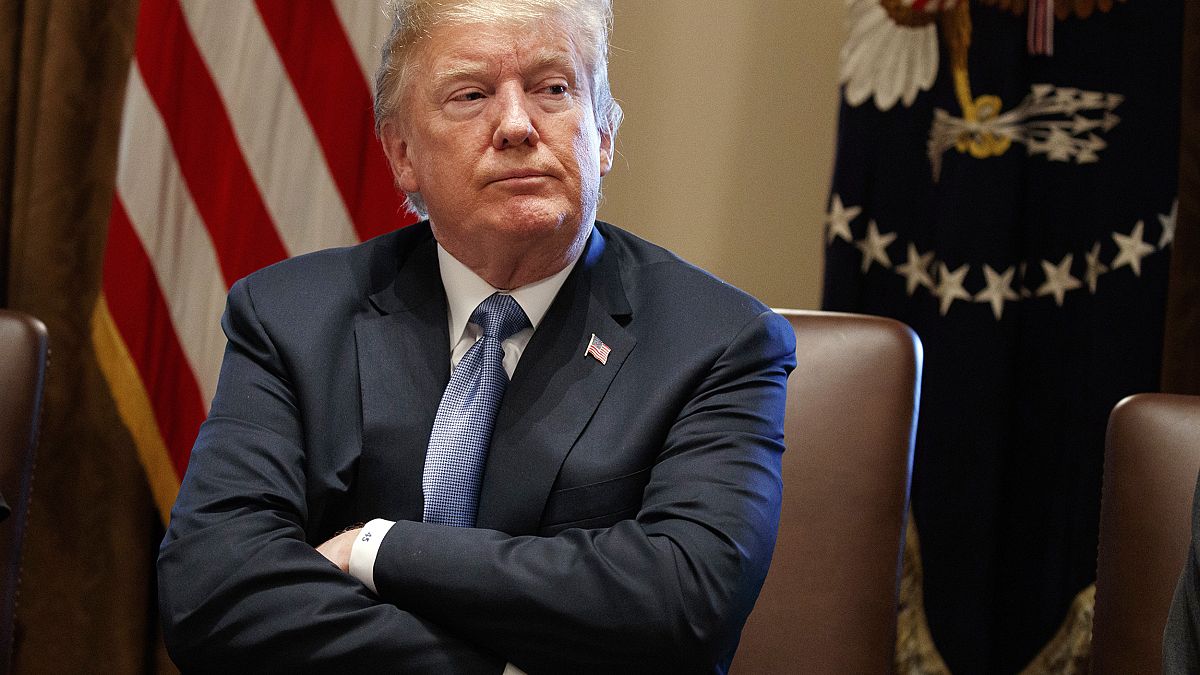A majority of Americans approve of how the president is handling the economy, but its unclear if the good times can last.
By James Pethokoukis
As part of President Trump's apparent effort be a two-termer, he uses any occasion to talk up the strong U.S. economy. For instance, last week at his Oval Office signing of an executive order ending the practice of separating undocumented immigrant families, the president assured the American people he was dealing with immigration "just like we dealt with North Korea, we dealt with Iran, we dealt with an economy that was going in the wrong direction." It's seemingly working: a new CNBC survey says that 51 percent of Americans approve of his handling of the economy.
One tiny problem: The economy was not "going in the wrong direction" when Trump was elected. It has been growing steadily, though unspectacularly, ever since the end of the Great Recession in summer 2009. What's more, the economy has been adding jobs for a whopping 92 consecutive months, the longest streak on record.
So far, the Trump-era economy has statistically been merely an extension of the Obama-era economy: economic growth about the same (roughly 2 percent annually), and job growth about the same (just shy of 200,000 a month). Same-old, same-old — even though, during the 2016 campaign, Trump made a lot of wild promises about how his policies (from tax cuts to deregulation to trade) would supercharge economic growth like America has never seen before.
Still, Trump does finally have his own positive story to tell.: A series of encouraging economic reports, such as retail sales, indicate that the economy is surging. The megabank JPMorgan, for example, now estimates the nation's gross domestic product, adjusted for inflation, is expanding at a "boomy" 4.0% annual rate in second quarter, almost twice the 2.2% growth rate experienced in the first three months of the year. And fellow Wall Street titan Goldman Sachs isn't far behind with a 3.9 percent forecast. What's more, some optimists think the current 4.7% GDPNow forecast from the Atlanta Fed is a better estimate of how things are shaping up.
Now, most experts — whether on Wall Street or in Washington — don't think growth as fast as that is sustainable; most are predicting the U.S. could see a couple of years of 3 percent growth. That's still pretty peppy, and something that hasn't happened in over a decade. Even better, we might finally be on the verge of seeing higher wages from both the faster GDP growth and the continuing fall in unemployment, now at decades' lows.
Trump fans are, obviously, touting this good news as proof that Trumponomics works, especially compared to Obamanomics; all the liberal and mainstream media naysayers who predicted the tax cuts would fail were wrong, they say. In not even a half term, in their minds, Trump has already made America pretty darn great again — at least as measured by economic stats.
Yet that's not quite right: the economic surge is an expected side effect of more than just tax cuts. Many economists had been predicting the big tax cuts (about $150 billion a year) combined with increased government spending (about $300 billion over the next years) would boost growth, at least for a while. As the Congressional Budget Office explained in its recent forecast, "because the tax cuts boost after-tax incomes, they, along with the increases in federal spending, are expected to add excess demand in the next few years."
And, not only is the surge no surprise, but the credit goes to both parties. While Democrats wanted no part of the tax cuts, the increased spending was a bipartisan affair.
But here's the really weird thing: Republicans have traditionally touted tax cuts as a way to boost long-term growth by enhancing incentives to work, save, and invest. This sort of juicing of the economy with tax cuts and spending increases is what Republicans used to dismiss as "sugar high" economics as recently as when Obama and the Democrats passed their big trillion-dollar tax and spending stimulus back in 2009. Nothing but a temporary boost that doesn't really alter the economy's deep fundamentals, they called it.
And all those currently rosy forecasts show the Trump-led growth surge fading by 2020 or so (possibly just in time for the reelection campaign) and the economy returning to its boring 2 percent growth baseline. One reason for this is that the tax cuts and higher spending are generating massive, trillion-dollar budget deficits as far as the eye can, which could hurt growth by crowding out private investment. (The importance of minding budget deficits are another issue on which the GOP has flipped since the Obama years.) So Trump might be helping make America great again, but only for a little while.
Nothing, of course, is set in stone. One sign that the effects of Trump's economic policies could outlast his first term would be an increase in productivity growth, or output per worker. If each worker produces more — whether from better training, better equipment, or doing their job differently — higher wages should follow.
But productivity growth has been moribund for more than a decade. Moreover, there's little evidence yet that anything Trump is doing has helped much. And if even productivity does boom, as it did during the mid-1990s through early 2000s, it could be the result of everything that's been happening for years in Silicon Valley, such as advances in artificial intelligence, rather than what Washington's been doing more recently.
Meanwhile, it could take years before economists are able to tease out any significant growth impacts from cutting business taxes or deregulation. In economic projections, there are no guarantees — other than Trump will surely try to take credit.
James Pethokoukis is an economic policy analyst at the American Enterprise Institute. He is also an official CNBC contributor.
This article was originally published on NBC News' Think. Opinions expressed in View articles are not those of euronews.


